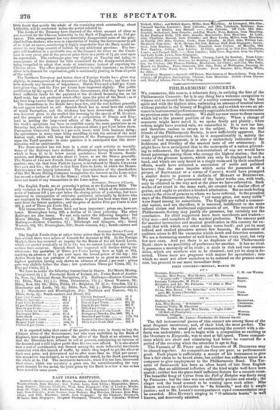PHILHARMONIC CONCERTS.
WE commence, this season, a reluctant duty, in noticing the first of the Philharmonic Concerts : for it is any thing but a welcome occupation to witness and to record the decline of a society commencing in the best spirit and with the highest aims, embracing an amount of musical talent without parallel in the history of English art, and to which we owe an ad- vance in instrumental performance only cognizable to those who remember its previous state in this country. We shall not now recur to those causes which led to the present position of the Society. When a change of measures might have saved it, we spoke freely and plainly ; when reform might have averted ruin, we counselled it. It is now too late, and therefore useless to return to the subject. Who were the real friends of the Philharmonic Society, is now sufficiently apparent. But if its approaching extinction be, as it unquestionably is, mainly the result of bad management, it is also a melancholy indication of the feebleness and frivolity of the musical taste of our aristocracy. It might have been anticipated that in the metropolis of a nation pretend- ing to refinement, the highest demonstrations of any art would have found patronage among those who occupy the highest station ; that the works of the greatest masters, which can only be displayed by such a band, and which are only heard in a single room and by their combined efforts, would have attracted a succession of noble and polished hearers ; that the same impulse which seeks the possession of a picture of RAFFAELLE or a statue of CANOVA would have prompted a similar desire to possess a sinfonia of MOZART or BEETHOVEN. We say " possess"—for possession of the latter works can, with truth, only be obtained in the way and at the place we have referred to. Such works of art stand in the same rank, are created by a similar effort of genius, and ought to awaken a kindred admiration. But no such feeling exists in the class of persons to whom we have referred. In the proudest days of the Philharmonic Society, " not many great, not many noble" were found among its subscribers. The English are called a commer- cial nation, and are therefore, it is assumed, indifferent to the more refined claims and intellectual enjoyments of art. The records of the Philharmonic Society may justify the premises, but certainly not the conclusion. Its chief supporters have been merchants and traders— City men—and members of the musical profession. The amount paid for musical instruction and musical gratification in this country far ex- ceeds that with which any other nation taxes itself; and yet its most refined and exalted pleasures attract few hearers., No succession of auditors arises to fill the vacancies which death and desertion occasion. We see a decreasing number of well-known faces every year, but very few new ones. And yet there is no duplicate of the Philharmonic Band : there is no possibility of preference for another. It has no rival. It possesses a monopoly of its trade ; it deals in rich and rare commo- dities, which are nowhere else to be obtained; and yet its shop is de- serted. These facts are pregnant with matter for speculation; into which we must not allow ourselves to be seduced on the present occa- sion, but proceed to our more immediate duty.
FIRST CONCERT—MONDAY, MARCH 20.
ACT I.
Overture, Euryanthe
Terzetto, Miss Buten. Miss HAWES, and Mr. nutmeg, L'usato ardir " (Semiramide) Rossrm.
Fantasia Violoncello, M. Pit= FILET.
Recitative and Air, Mr. Putturs, " 0 what is Man"
(The Fall of Babylon) &ORR. Scene, Miss BIRCH. "' Su Grmelda," with Violin Obli- gato, Mr. LODER (Griselda) Pars.
Sinfonia, G Minor MOZART oar n.
Sinfonia in D BEETHOVEN.
Aria, Miss Hawn. 0 Salutaris " CEIERUBINI.
Concerto Violin, M. Drituvraz DELOYERE.
Duetto, Miss Braes and Miss HAWKE, Vaghe Colle"
(II Ratio di Proserpina) WINTER. Overture, Calypso Warren.
Leader, Mr. Looza—Couductor, Sir GEORGE START.
The full instrumental pieces of this concert are among those of the most frequent recurrence, and, of their kind, the most perfect. The deviation from the usual plan of commencing the concert with a sin- fonia was undesirable ; and to begin with a composition so exciting as the Overture to Euryanthe, was to start at full speed. Those composi- tions which are short and stimulating had better be reserved for a period of the evening when the attention is apt to flag. The Fantasia of M. PILET and the Concerto of M. DELOFFRE may be classed together. As compositions they are poor, as performances good. Each player is sufficiently a master of his instrument to give him a fair claim to be heard alone, but neither has sufficient talent as a composer to give employment to the Philharmonic Band. The Ter- zetto of Semiramide has been so often heard of late from English singers, that an additional infliction of the kind might well have been spared ; neither has the pigce itself sufficient feature for a concert-room. The beautiful Song of Cyrus from the Fall of Babylon was finely sung by PHILLIPS ; but the time was not sufficiently precise and steady ; the singer and the band seemed to be waiting upon each other. Miss BIRCH revived an old favourite in " Su Griselda," and did it ample justice ; and to Mr. LODER'S accompaniment equal commendation may be awarded. Miss HAWES'S singing in " 0 salutaris hostia " is well known, and deservedly admired.
C. M. VON WESEL'


























 Previous page
Previous page